Ethiopia inaugurates $4.8B mega dam, unveils nuclear power plan
Premier says Grand Ethiopian Renaissance Dam, Africa’s largest hydroelectric project, will also benefit downstream countries
 Photo Credit: Prime Minister Office of Ethiopia
Photo Credit: Prime Minister Office of Ethiopia
ADDIS ABABA
Ethiopia on Tuesday inaugurated the nearly $5 billion Grand Ethiopian Renaissance Dam (GERD), Africa’s largest hydroelectric project, marking the completion of more than a decade of construction on the Blue Nile.
One of the major projects revealed alongside the inauguration is a plan to build a nuclear power plant.
“With the GERD completed, that chapter is closed. We now move to other significant projects in the coming years. Ethiopia is preparing to build a nuclear power plant that will be used solely for peaceful purposes,” said Prime Minister Abiy Ahmed.
He also announced plans for Africa’s mega projects, including the largest aviation hub with a new airport for Ethiopian Airlines with an initial capacity of 60 million passengers annually, alongside new oil and gas ventures and a fertilizer plant.
The GERD, launched in 2011 by the late Prime Minister Meles Zenawi, is designed to generate 5,150 megawatts of electricity, placing it among the world’s largest hydropower plants. Ethiopian officials said it will ease chronic power shortages and allow electricity exports across East Africa.
Abiy hailed the dam as a national milestone and symbol of self-reliance, noting that the Nigat Lake reservoir, or “Dawn Lake,” represents the end of Ethiopia’s “era of begging.”
“This lake has brought with it a wealth greater than Ethiopia's GDP. This generation has accomplished a great deed with the Renaissance Dam. The era of begging has ended,” said Abiy.
Calling the GERD “the biggest mega project in the history of Black people,” he stressed Ethiopia does not seek harm but “shared prosperity.”
Kenyan President William Ruto praised the project as proof that Africa can “shape its own destiny,” calling it a Pan-African statement.
“The path to peace lies in unity, not isolation,” he said.
South Sudanese President Salva Kiir described the GERD as “a symbol of unity, sacrifice, and determination,” while Somalia’s President Hassan Sheikh Mohamud urged regional cooperation.
“Share resources, share brotherhood,” he said.
Djibouti’s President Ismail Omar Guelleh called the inauguration “a day of great victory.”
For 14 years, millions of ordinary Ethiopians, including farmers, daily laborers, students, and civil servants, purchased bonds and made donations to help finance the project.
Egypt and Sudan, however, remain concerned. Both argue that Ethiopia filled and began operating the dam without a legally binding water-sharing agreement, and neither attended the ceremony despite having received official invitations from Ethiopia.
Egypt, which said its nation relies on the Nile for nearly 90% of its water, fears reduced inflows during drought years, while Sudan has voiced alarm about dam safety and uncoordinated releases.
Cairo and Khartoum issued a joint statement last week that condemned Ethiopia’s “unilateral actions” and warned that the dam poses a continuous threat to regional stability.
Ethiopia insists the GERD will ultimately benefit all Nile Basin countries by stabilizing flows and reducing flooding, though negotiations on its operation remain deadlocked.
Anadolu Agency website contains only a portion of the news stories offered to subscribers in the AA News Broadcasting System (HAS), and in summarized form. Please contact us for subscription options.







